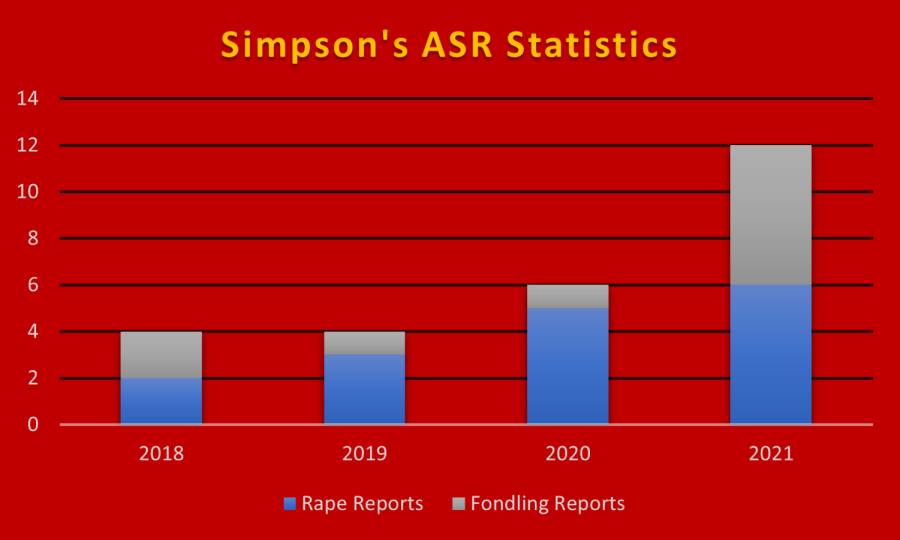Auditing Simpson’s Title IX process
Simpson’s ASR shows increased rates of sexual misconduct since the Pandemic.
April 12, 2023
Simpson College’s Title IX office, which handles most sexual misconduct complaints, lacks transparent information on occurrences and how cases are handled.
While detailed information does exist on how complaints are handled, it can be difficult to find. There is also limited knowledge of sexual misconduct at Simpson.
The college has an Annual Security Report (ASR), which is prepared every year by Chris Frerichs, the head of Simpson’s security, but the ASR is restricted in what it captures.
“It’s very specific,” Frerichs said. “It’s for a calendar year, has very specific definitions and has to occur in certain locations.”
Those locations are either on-campus or in certain sorority houses.
These limitations prevent the administration and students from being able to actually know the prevalence of sexual violence on Simpson’s campus.
Vice President for Diversity, Equity and Inclusion and Title IX coordinator Keyah Levy says she hasn’t implemented a recording process yet.
“Right now, we don’t have a streamlined process for collecting those reports,” she said.
Levy did know so far that this academic year there have been nine initial reports, three formal reports, one hearing and two dismissals.
While Levy is working on a method of collecting data as well as listing potential sanctions, reports are likely lower as many incidents don’t get reported.
Simpson also faces the challenge of getting students to utilize available resources.
Jenny Vargas, the director of counseling and faculty advisor for the Sexual Assault Response Advocates (SARA), says that the number of reports SARA has received has gone down.
“[But] that doesn’t mean sexual assaults are not occurring,” she said.
Senior Max Cleveland, a member of SARA, pointed out that there isn’t a clear reason why Simpson’s reporting rates seem to have gone down.
“Maybe the first years aren’t aware of the services we offer,” he said. “It’s all speculation, we just don’t know.”
Jenna Pfeiffer, a junior who is also a SARA, said that getting students to report is difficult for a variety of reasons.
“We can’t help unless you reach out,” she said. “But when in trauma, you need to feel safe and know who you’re talking to.”
Pfeiffer said that she thinks the main thing keeping students from reporting more regularly is a lack of knowledge.
“Title IX needs to be more known,” she said. “Who are the officers? What is the process? Most students don’t know.”
Pfeiffer also said that the Title IX office has frustrated many survivors.
“There have been many people who felt like they weren’t heard or listened to in Title IX,” she said.
Another significant gap that Pfeiffer and Cleveland both identified is a lack of clarity on what to do when professors or administration engage in sexual misconduct.
“Adding in the dynamic that professors have power over students, is more of an issue,” Cleveland said. “We’re not given much on that specifically.”
Pfeiffer was more critical, saying that it’s a much bigger problem than people are making it out to be.
“A lot of people are scared to talk about it,” she said. “There are more people on this campus that are doing that kind of stuff than we want to admit.”
Pfeiffer also made it clear that information on prevalence is not as important as information on the process.
“Numbers can never tell the whole story,” she said. “What’s more important is knowing how these issues are addressed.”
According to RAINN, America’s largest anti-sexual violence organization, only one in three sexual assaults are reported to the police. Among female college students, only one in five reports.
Cleveland says that the Title IX process is too opaque to be approachable.
“I’ve heard from people that there are gaps,” he said. “We don’t know what the gaps are until a specific case comes up.”
Pfeiffer said that reforming the Title IX process to create a better experience would help more students come forward.
“More people may be willing to report if we show those who do care and compassion,” she said.












